
Felix Mendelssohn
1858-1924
From Wikipedia, the free encyclopedia
History of HP renewal Sample of the file
(Japanese)

Felix Mendelssohn
1858-1924
From Wikipedia, the free encyclopedia
![]()
The page of the literal translation for Mendelssohn's masses & anthems
It is needless to say that it is how important thing to sing
when each word of the words is fully understood on the occasion of singing a
vocal music text in music.
But there are not many sites or books which
explain the word for word translation of the text.
This page was made by this viewpoint so that it could answer such needs
at all. Though it is still only on the amateur stage, I want to make this
a better page by everyone's support. I am happy if I could have an advice
to me about a point to modify.
Though there are many fundamentally common words among various masses, each mass has its slightly different contents,structure and backgrounds.On the top of these contents,I tryed to explain its proper nouns and the special words and phrases used in masses as well.
You can understand more easily the words if you study the text,listening the actual performance of CDs
In
case of printing,you are advised to download the excel file first and make an
adjustments of its lay-out of the text.
(If you don't
use MicrosoftExcel,you can make use of free soft OpenOffice.org
If you have questions,adviecs or other communications pls email me to
the adress、mondomusicale2006-hp@yahoo.co.jp Y.Kawazu
![]()
John 1--The Word Became Flesh(1-1-14)
1In the beginning was the Word, and the
Word was with God, and the Word was God. 2He was with God in the beginning. 3Through him all things were made;
without him nothing was made that has been made. 4In him was life, and that life was the light of men.
 Mail
Mail
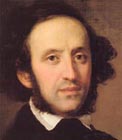 |
Mendelssohn Psalm
22 詩編 / 22編 英国大使館合唱団用 Mendelssohn Psalm 22 English Version For British Embassy Choir
|
![]()
|
Jakob Ludwig Felix Mendelssohn
Bartholdy, born and
generally known as Felix Mendelssohn[1]
(February 3, 1809 ? November 4, 1847) was a German composer, pianist and conductor
of the early Romantic period. The grandson of the philosopher
Moses Mendelssohn, he was born to a notable Jewish family which
later converted to Christianity. His work includes symphonies, concerti, oratorios, piano
and chamber
music. After a long period of relative denigration due to changing musical
tastes and antisemitism in the late 19th and early 20th centuries,
his creative originality is now being recognized and re-evaluated. He is now
among the most popular composers of the Romantic
era. Mendelssohn was born in Hamburg, Germany,
the son of a banker,
Abraham Mendelssohn (who later
changed his surname to Mendelssohn Bartholdy, and who was himself the son of the
German-Jewish philosopher Moses
Mendelssohn), and of Lea Salomon, a member of the Itzig family
and the sister of Jakob Salomon Bartholdy. Felix grew up in an environment
of intense intellectual ferment. The greatest minds of Germany were frequent visitors
to his family's home in Berlin, including Wilhelm von Humboldt and Alexander von Humboldt. His sister Rebecca married the Belgian mathematician
Lejeune Dirichlet. Felix probably made his first
public concert appearance at the age of nine, when he participated in a chamber
music concert accompanying a horn
duo.[6]
He was also a prolific composer from an early age. As an adolescent, his works
were often performed at home with a private orchestra for the associates of his
wealthy parents amongst the intellectual elite of Berlin. Between the ages of
12 and 14, Besides music, Mendelssohn's
education included art, literature, languages, and philosophy. He was a skilled
artist in pencil and watercolour, he could speak (besides his native German)
English, Italian, and Latin, and he had an interest in classical literature In 1835, Felix was appointed as
conductor of the Leipzig Gewandhaus Orchestra. This
appointment was extremely important for him; he felt himself to be a German and
wished to play a leading part in his country's musical life. Mendelssohn married Cecile
Jeanrenaud, the daughter of a French Protestant clergyman,[20] on
March 28, 1837. The couple had five children
|
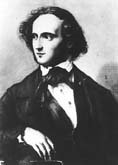  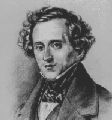  |
|
|
![]()
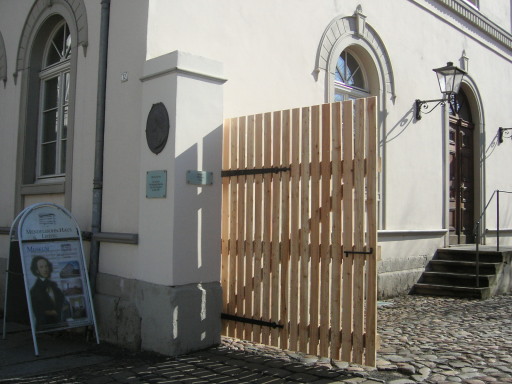 |
Jakob Ludwig Felix Mendelssohn Bartholdy, born, and generally known in English-speaking countries, as Felix Mendelssohn[1] (February 3, 1809 ? November 4, 1847) was a German composer, pianist, organist and conductor of the early Romantic period. The grandson of the philosopher Moses Mendelssohn, he was born to a notable Jewish family which later converted to Christianity. He was recognised early as a prodigy, but his parents were cautious and did not seek to capitalise on his abilities. Indeed his father was disinclined to allow Felix to follow a musical career until it became clear that he intended to seriously dedicate himself to it.[2] Early success in Germany was followed by travel throughout Europe; Mendelssohn was particularly well received in England as a composer, conductor and soloist, and his ten visits there, during which many of his major works were premiered, form an important part of his adult career. His essentially conservative musical tastes however set him apart from many of his more adventurous musical contemporaries such as Liszt, Wagner and Berlioz. The Conservatoire he founded at Leipzig became a bastion of this anti-radical outlook. Mendelssohn's work includes symphonies, concerti, oratorios, piano and chamber music. He also had an important role in the revival of interest in the music of J. S. Bach. After a long period of relative denigration due to changing musical tastes and antisemitism in the late 19th and early 20th centuries, his creative originality is now being recognized and re-evaluated. He is now among the most popular composers of the Romantic era. |
![]()
![]() リンク集(合唱団・指揮者・ソリスト・音楽ファイルサイトなど)
リンク集(合唱団・指揮者・ソリスト・音楽ファイルサイトなど)
![]()
![]()
声楽曲の為の逐語訳のHP
![]() Requiem奉唱ホームページ
Requiem奉唱ホームページ
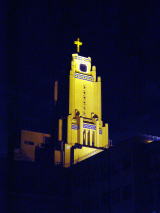 ミサ曲・宗教曲の逐語訳ホームページトップページへもどる
ミサ曲・宗教曲の逐語訳ホームページトップページへもどる
![]() Arie/Canzoni
Italianeイタリア・アリア・カンツォーネ逐語訳ホームページ
Arie/Canzoni
Italianeイタリア・アリア・カンツォーネ逐語訳ホームページ
![]()
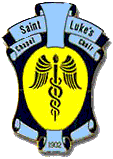

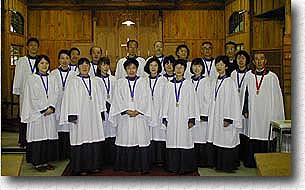
聖路加国際大学礼拝堂聖歌隊ホームページ
![]()
![]()
![]() Year Schedule of My Next stages
Year Schedule of My Next stages![]()
![]() Feb.9,2008(Sat) 7pm Brahbms:Ein deutsches Requiem(Meguro persimmon)
Feb.9,2008(Sat) 7pm Brahbms:Ein deutsches Requiem(Meguro persimmon)
![]() Msy 10,2008(Sat) 7PM(Suginami Koukaido-Ogikubo) Rossini:Petite Messe Solennenlle
Msy 10,2008(Sat) 7PM(Suginami Koukaido-Ogikubo) Rossini:Petite Messe Solennenlle
For discouted tickets available Mail
Mail
![]()
![]()
 Finished Concerts(Main ones)
Finished Concerts(Main ones)
![]() Feb.9,2008(Sat) 7pm Brahbms:Ein deutsches Requiem(Meguro persimmon)
Feb.9,2008(Sat) 7pm Brahbms:Ein deutsches Requiem(Meguro persimmon)
![]() Nov.2,2007 Mozart :Requiem(St.Luke International Chapel)
Nov.2,2007 Mozart :Requiem(St.Luke International Chapel)
![]() Feb.9,2008(Sat) 7pm Brahbms:Ein deutsches Requiem(Meguro persimmon)
Feb.9,2008(Sat) 7pm Brahbms:Ein deutsches Requiem(Meguro persimmon)
![]() Msy 10,2008(Sat) 7PM(Suginami Koukaido-Ogikubo) Rossini:Petite Messe Solennenlle
Msy 10,2008(Sat) 7PM(Suginami Koukaido-Ogikubo) Rossini:Petite Messe Solennenlle
For discouted tickets available Mail
Mail
![]() 2007 St.Luke's International Hospital, Chapel Choir
2007 St.Luke's International Hospital, Chapel Choir
Summer Concert Program
Date: Aug.26(Sun) 2007 arround 10:30 after the Service
Place: Karuizawa Shaw Memorial Chapel
Program:1) Locus iste A.Bruckner 2) Tantum ergo A.Bruckner 3) Virga esse
A.Bruckner
4) Jesu dulcis memoria T.L.Victoria 5) Panis angelicus G.P.Palestrina 7)
Above all praise F.Mendelssohn Etc.
Karuizawa Shaw Memorial Chapel

![]() 5/12(Sat)7pm Tokyo International Singers
5/12(Sat)7pm Tokyo International Singers
Program:Rossini Stabat Mater & Puccini Messa di Gloria![]()
Tokyo new city orchestra
Conducted by: Marcel L'Esperance
Soprano:Kaori Hirai Mezzo Sop:Machiko Suzuki Tenor:Dominique Morarez
Bass:Tetsuo Kitamura
Venue:Meguro Persimmon Hall Tichet Price:¥2,900
![]() 3/18(Sun):Schubert Mass No.6 Concert
3/18(Sun):Schubert Mass No.6 Concert
Conducted by:Bon Fujisaki Senzoku Orchestra
Venue: Maeda-hallSenzoku Maeda Hall(SENZOKU MUSIC College)
By :Senzoku Gakuen college of Music Kanai seminar
Co-By :Franz Schubert Society
![]() 2/18(Sun)Charity Concert
2/18(Sun)Charity Concert ![]()
Program:Schubert Mass No.6、Kyrie,Gloria Sopranos solo,Piano & Organa soloソプラ
Venue:Catholic Saginuma Church 14:30pm Tichet Price:¥2000(To be donated for Church renewal Construction)
![]() Bruckner 《Mass No.3"Mass in F minor" 》 Brahms 《Nanie 》
Bruckner 《Mass No.3"Mass in F minor" 》 Brahms 《Nanie 》
Feb.10 2007(Sat) at 7:00Pm
Tokyo International Singers With Tokyo City orchestra
Conducted by: Marcel L'Esperance Venue:New Suginami Hall New Suginami-ku Large Hall
![]() Countdown Concert of Beethoven No.9 at IKSPIARI
Countdown Concert of Beethoven No.9 at IKSPIARI
19pm in Dec.31 Disney Resort
Directed by Takashi Kinoshita Urayasu City Orchestra
◆Solists◆
Soprano:Toshimi Nagayasu Alto:Tomoko Kasahara Tenor:Izumi Furusawa Bass:Licht Furusawa
Chorus:IKSPIARI CountDown No.9 Chorus Chorus Director:Licht Furusawa
![]() Gloria chapel in ShinagawaMessiah:
Gloria chapel in ShinagawaMessiah:
Dec.5(Tue) at 6pm Venue:Gloria chapel
Program:Oratorio Messiah HWV.56 G.F.Handel
Conducted by:Keizo Fujimoto
![]() St.Luke's International Hospital, Chapel Choir
St.Luke's International Hospital, Chapel Choir![]()
Summer
Concert Program
Date: Aug.27(Sun) 2006 arround 10:30 after the Service
Place: Karuizawa Shaw Memorial Chapel
Program:O saviour of the world(J.Goss&A.Somervell)、
Haec dies(J.Arcadert&W.Byrd)
Ave verum corpus(E.Elgar&W.A.Mozart)
Karuizawa Shaw Memorial Chapel

![]() Prof.KanaiSeminar's Ensemble & Schubert Mass No.6 Concert
Prof.KanaiSeminar's Ensemble & Schubert Mass No.6 Concert
July.15(Sat):13:30〜SCHUBERT Choir(Soli)(Will take Solo part together with
students)
Program:Schubert Mass No.6 Conductor : Mayumi Motomura
Orchestra :Senzoku Gakuen
Orchestra
Venue: Nissay Theater
Pilotis Nissay Theater Performance
Schedule
By :Senzoku
Gakuen college of Music Kanai seminar
Co-By :Franz
Schubert Society
![]() Quarto
Incontro Musicale
Quarto
Incontro Musicale
Main sponsor;Studiolo(Italian Language School)
EVENING FOR iTALIAN ARIAS AND CANZONE
(I SANG Mozart:Dalla sua pace AND Non ti scordar di me
Sept.16(Sun)July 2006 1
| MY main repertory |
Since Mar.31 2009 HP Analysis
![]()
![]()












